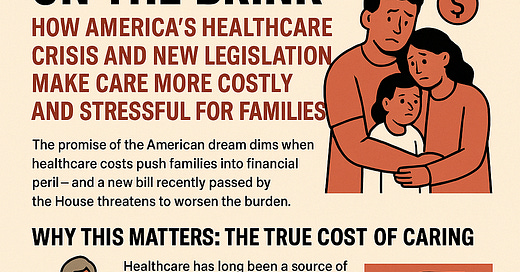Financial Security on the Brink: How America's Healthcare Crisis and New Legislation Make Care More Costly and Stressful for Families
The promise of the American dream dims when healthcare costs push families into financial peril - and a new bill recently passed by the House threatens to worsen the burden.
The promise of the American dream dims when healthcare costs push families into financial peril — and a new bill recently passed by the House threatens to worsen the burden. While this may not fall under the usual banner of cybersecurity, I view financial security as a foundational pillar of both personal and national resilience. Today, I’m writing about legislation with the potential to cause significant harm to everyday Americans, particularly those in lower-income brackets and rural communities, where hospital closures and service reductions are a looming threat.
In the United States, healthcare has long been a source of anxiety and financial strain for millions of families. But what's increasingly clear is how deeply intertwined medical costs are with everyday financial security — and how this new legislation threatens to exacerbate an already critical crisis, hitting hardest those caring for aging parents, managing chronic conditions, or supporting vulnerable loved ones.
Why This Matters: The True Cost of Caring
For many American households, especially those with elderly parents or chronically ill relatives, healthcare expenses are not a rare emergency-they are an ongoing, crushing reality. Unlike many developed nations where healthcare is treated as a universal right, here the system's complexity and high costs mean families face impossible choices every day: postpone treatment, choose between medications and rent, or deplete savings to cover bills.
When medical expenses climb, they don't just affect health-they ripple through the family's entire financial life. Savings meant for education, retirement, or emergencies vanish. Credit scores suffer. Stress skyrockets. The prospect of financial ruin looms large, particularly for middle-class families who don't qualify for government aid but still struggle with insurance gaps, high deductibles, and surprise bills.
The New H.R.1 'One Big Beautiful Bill' - More Problems, Not Solutions
Adding insult to injury, the recent healthcare legislation pushed through the House-sometimes called the "Big Beautiful Bill"-does little to ease these burdens. In fact, many experts warn it will increase healthcare costs for ordinary Americans, reduce protections, and complicate access to care.
Key concerns include:
Higher Out-of-Pocket Costs: The bill does not address rising deductibles and co-pays, meaning families will still face steep bills before insurance even kicks in. For those managing chronic illnesses or multiple doctor visits, this translates to mounting monthly expenses. Source: KFF
Reduced Coverage Protections: Some provisions weaken essential benefits and allow insurers greater leeway to deny coverage or increase premiums based on pre-existing conditions or age-hitting elderly Americans and those with health challenges the hardest.
Cuts to Medicare and Medicaid: The bill includes cuts to these vital programs, which support millions of seniors and low-income families. These cuts will accelerate the closure of rural hospitals, jeopardizing access to care for entire communities and forcing families to travel longer distances for essential services. Source:chartis
Limited Support for Caregivers: The bill neglects programs that assist family caregivers-mostly women-who juggle jobs, eldercare, and medical appointments without sufficient financial or social support. Source: aarp
Increased Complexity and Confusion: By layering new regulations over a fragmented system, the bill threatens to deepen bureaucracy, making it harder for families to navigate claims, dispute denials, or find affordable plans.
The Impact on Families with Aging Parents
Caring for aging parents is already a monumental task-emotionally, physically, and financially. When healthcare costs rise unchecked, the pressure mounts exponentially. Adult children often find themselves forced to dip into retirement savings, take on additional debt, or cut back on their own healthcare to cover their parents' bills.
Rural families face unique challenges. The impending closures of rural hospitals due to Medicare and Medicaid funding cuts mean that many will lose nearby emergency rooms and essential services, adding travel time and costs that further strain family resources and health outcomes.
The new bill's failure to protect this vulnerable group effectively means:
More families are forced into "medical bankruptcy" or long-term debt.
Increased stress on caregivers who face greater financial uncertainty.
Fewer options for affordable long-term care or home-based services.
Greater risk that elderly loved ones will delay or forgo necessary treatments due to cost fears and limited access.
What This Means for Everyday Americans
This healthcare crisis isn't just about policy wonks or insurance companies-it's about real people's lives and wallets. It makes life harder and more expensive for:
Working adults balancing jobs, family, and care responsibilities.
Seniors living on fixed incomes with growing medical needs.
Small business owners who can't provide affordable benefits to employees or themselves.
Anyone who unexpectedly faces illness or injury and lacks a financial cushion.
The ripple effects extend beyond individuals-financial strain reduces consumer spending, dampens economic growth, and increases reliance on social safety nets.
How We Got Here-and Where We Need to Go
At the heart of the problem is a healthcare system that prioritizes profit over people, with powerful lobbies blocking reforms that would lower costs and expand access. The new bill's passage highlights the uphill battle for meaningful change and underscores the urgent need for policies that:
Expand affordable, comprehensive coverage for all ages.
Protect against surprise billing and excessive out-of-pocket costs.
Safeguard Medicare and Medicaid funding to preserve rural hospitals and critical access.
Support family caregivers through financial assistance and resources.
Simplify the healthcare system to empower patients and families.
What You Can Do
As costs climb and protections erode, ordinary Americans must raise their voices. Contact your representatives here. Demand transparency, fairness, and support for families struggling to keep their loved ones healthy without sacrificing financial stability.
The health of our parents, the security of our families, and the economic future of our nation depend on it.
Want to support my work consider buying me a coffee






Great information
Excellent read!!